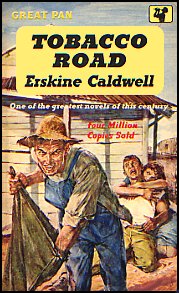
17, 1903, in Moreland, Ga., and moved with his parents from one place to another in the Carolinas, Virginia, Florida, Tennessee and back to Georgia. Caldwell, who took him from place to place in the South during his boyhood and showed him the misery of dirt-poor people.Ĭaldwell was born Dec.

He recalled for that interviewer that it was his father, the Rev. He said he had resisted “glorifying the sensational and knowingly falsifying the anguish or the jubilation” of his characters because “the human spirit should not be ravished and outraged in print by ghouls at large.”Īlthough reviled in his early years by many critics, Caldwell once told the Saturday Review, “If you are going to take criticism very seriously, then you will stop writing anything.” He said in that book: “My goal from the beginning has been to be a writer of fiction that revealed with all my might the inner spirit of men and women as they responded to the joys of life and reacted to the sorrows of existence.” “From the first bright rays of dawn to the shade of evening,” he wrote, “the day is done.”

In his autobiography, “With All My Might,” released in March by Peachtree Publishers, Caldwell clearly sensed that his career was over.

If one of my short stories opened someone’s eyes, then I have been successful.” There’s been a great deal of change in rural Georgia. “I must have had an impact for good rather than bad,” he said in 1985, when at age 82 he returned to Georgia for a state-sponsored writers’ program.


 0 kommentar(er)
0 kommentar(er)
